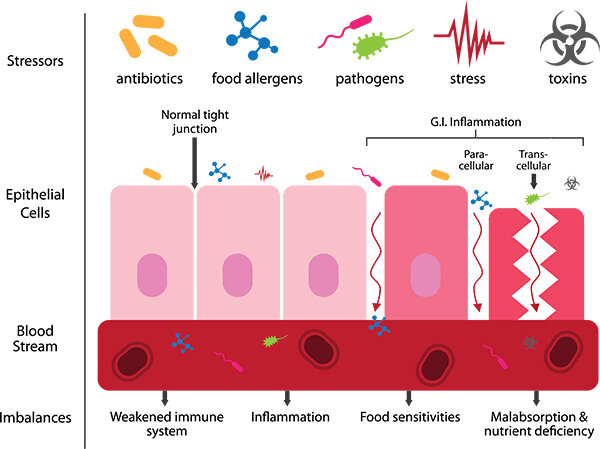3 Ways To Improve Intestinal Permeability (aka Leaky Gut)
Aug 17, 2020
Leaky gut, also known as increased intestinal permeability, is a popular term floating around, and for good reason - more and more people are experiencing digestive concerns.
So let’s break down exactly what leaky gut is, why it's happening, and ways we can decrease it.
First of all ‘leaky gut’ is not actually a medically recognised term or a diagnosis. To keep things official, we will use the term ‘increased intestinal permeability’. Another term to describe the same thing is ‘intestinal epithelial barrier dysfunction’.
What is increased Intestinal Permeability?
First let's explain digestion 101… The digestive tract is designed to:
- break down food
- absorb nutrients.
The walls of our intestine, also called the intestinal epithelium, is specifically designed to create a barrier between the contents of our intestine & the body, and it has two main roles:
-
It acts as a barrier and prevents the entry of harmful substances from the intestine into the bloodstream, such as foreign particles, toxins & microorganisms.
-
It works like a filter, and allows the uptake of beneficial nutrients from the intestine into the bloodstream.
To perform both of these roles, the structure of the intestinal epithelium is made up of tight gap junctions. The image below will help to explain….

So, increased intestinal permeability is when these small gaps in-between the junctions become larger than they should.
When this happens, food particles, toxins that our body is working to break down and excrete, and even hormones can make their way past the intestinal epithelium ‘barrier’ into the bloodstream.
What causes it?
At this stage, there is no one cause for increased intestinal permeability but what we do know is that the following may be leading contributors
-
Poor diet: a typical western diet low in fibre and high in processed foods
-
High sugar diets
-
Alcohol
-
Dysbiosis: this is an imbalance of good and bad bacteria in our microbiome.
(SPOILER ALERT. I'm going to be doing a second part series explaining more about dysbiosis and the microbiome. Keep your eyes peeled).
-
Inflammation
-
Medication: long term use of non-steroidal anti-inflammatory drugs (NSAIDs), proton-pump inhibitors (PPI’s), and the oral contraceptive pill (OCP) & antibiotics are also problematic, (although necessary in some situations)
-
Stress
-
Trigger foods: including gluten, dairy, eggs, soy, refined sugar, caffeine and alcohol.
What are the symptoms of Increased permeability
-
Chronic diarrhea, constipation, gas or bloating
-
Nutritional deficiencies
-
Low immunity
-
Headaches, brain fog, memory loss
-
Excessive fatigue
-
Skin rashes and problems such as acne, eczema or rosacea
-
Cravings for sugar or carbs
-
Joint pain
-
Mood changes
-
Food allergies
-
Increased intestinal permeability can also progress to a number of conditions including:
-
Arthritis
-
Depression, anxiety & ADHD
-
Crohn’s disease
-
Autoimmune diseases such as rheumatoid arthritis, lupus, or celiac disease
3 Ways to Reduce Intestinal Permeability
1. REMOVE INFLAMMATORY CONTRIBUTORS
-
Excess alcohol, sugar and processed foods: It’s best to keep these to a minimum
-
Trigger foods: Such as gluten, dairy, eggs, soy, refined sugar, caffeine and alcohol. Please note that not everyone will have the same trigger foods.
-
Problematic medications: Please don't suddenly stop everything you are taking!! Speak to your GP before making any changes. But if you are the type of person who pops an ibuprofen every time you have a headache, I would reconsider this.
-
Stress: Think about what is causing your stress, and investigate ways to reduce or manage this. Mindfulness practices can be a great tool.
2. SUPPLEMENT WITH NUTRIENTS AND HERBS
-
Glutamine: 5g twice daily, to strengthen the intestinal barrier.
-
Slippery elm: 1g twice daily, in powdered form
-
Bone broth: 1 cups three times daily
-
Aloe vera: 30ml twice daily on an empty stomach
-
Zinc carnosine: 30mg twice daily with food
3. BUILD A HEALTHY MICROBIOME
The environment of our gut bacteria can directly improve the integrity of our intestinal lining. To do so, incorporate the following:
-
Fibre: Include an array of fruit, vegetables, legumes & wholegrains
-
Prebiotics: Foods include dandelion greens, onion, garlic, asparagus, banana, cacao, and flaxseed, to name a few. Supplements such as partially hydrolysed guar gum (PHGG), galacto-oligosaccharides (GOS), and lactulose may also be beneficial.
-
Probiotics: Found in foods such as greek yoghurt, sauerkraut, kefir and kombucha. High quality probiotics supplements may also be a good addition.
If you are experiencing digestive symptoms or think you have intestinal permeability and want individualised support, book in for a session here.
References
https://www.ncbi.nlm.nih.gov/pmc/articles/PMC5988153/
https://www.ncbi.nlm.nih.gov/pmc/articles/PMC4253991/
https://www.ncbi.nlm.nih.gov/pmc/articles/PMC6104804/
https://www.ncbi.nlm.nih.gov/pmc/articles/PMC6095905/

